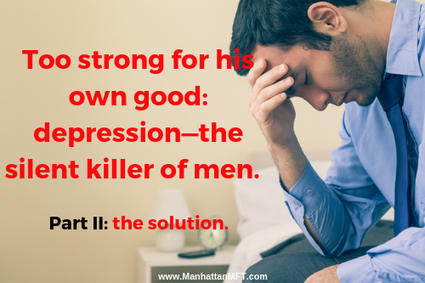 By Dr. Amanda Craig, PhD, LMFT Depression is a major psychiatric disorder that frequently has biological underpinnings. It affects men and women equally, but men are less likely to seek treatment and four times more likely to commit suicide. This blog provides an overview of available treatment options and coping tools you can start using immediately. If you or someone you care about is in crisis: In Part I we explored the symptoms and unique challenges faced by men suffering from depression. We know that men are often hesitant to share feelings or seek help, which may be why men are four times as likely to commit suicide as women. It is important to reiterate once again that if you or someone you care about is in crisis, we urge you to seek help immediately. You can:
If these measures seem drastic, remember that a life is at stake. The treatment of depression While there isn’t a one-size-fits-all prescription to cure depression, there are scientifically-driven treatments that can help one recover. Psychotherapy, medication, or the combination of the two are among the most common and effective solutions, but one should also consider alternative treatments and lifestyle changes to amplify the effects of standard therapies. In addition, a physical checkup with your primary care doctor can rule out illnesses with similar symptoms and flush out physical causes of depression, including the side effects of prescription medications. However, before we dive into coping tools for depression, let’s talk about what will NOT help. Self-medication with alcohol, drugs, excess food, porn, gambling, shopping, or binge-watching TV may seem like comforting solutions, but they only temporarily numb out the pain and ultimately create more problems and deepen the depression by impairing health, creating personal, financial, and legal problems, and inducing shame. Medication Psychiatric medications used to treat depression are called antidepressants. Different types of antidepressants address varying causes of depression and provide corresponding solutions. Although a general practitioner can prescribe antidepressants, a psychiatric specialist is usually better trained to assess the condition, find the best course of treatment, hone in on the right medication combination and dosage, and minimize any side effects. It is important to note that antidepressants may take several weeks to become effective, may cause serious side effects, and should not be discontinued without doctor’s supervision. Seeking help does not make one weak - |
Download our printable |
Depression is really one of the most challenging of mental problems so, this article is a good help to understanding depression for us and for the people around us. Thank you so much for this article.
Categories
All
Abby Crews
ADHD
AEDP
Amanda Craig
Amelia Flynn
Angie Sadhu
Anxiety
Back To School
Breast Cancer
Brenda Nicholls
Cliff Shuman
Coronavirus
Couples
COVID 19
COVID-19
Dads
Daughters
Debra O'Donnell
Depression
Divorce
Earth Love
Eating Disorders
Education
Emotion
Family
Fear
Holidays
Hope
Jenna Hendricksen
Keith Dixon
Kimberly Kuskovsky
Life Harmony
Michelle Woodward
Parenting
Personal Growth
Premarital
Romance
Sarah Trance
Self Care
Self Compassion
Sex
Singles
Stand In Solidarity
Stress Management
Telehealth
Archives
March 2023
December 2022
June 2022
May 2022
January 2022
June 2021
May 2021
April 2021
October 2020
June 2020
April 2020
March 2020
February 2020
June 2019
April 2019
March 2019
January 2019
December 2018
June 2018
May 2018
April 2018
March 2018
February 2018
January 2018
May 2017
April 2017
March 2017
February 2017
January 2017
December 2016
November 2016
October 2016
September 2016
August 2016
July 2016
June 2016
May 2016
March 2016
February 2016
January 2016
December 2015
November 2015
October 2015
September 2015
August 2015
June 2015
May 2015
April 2015
February 2015
January 2015
[email protected]


 RSS Feed
RSS Feed